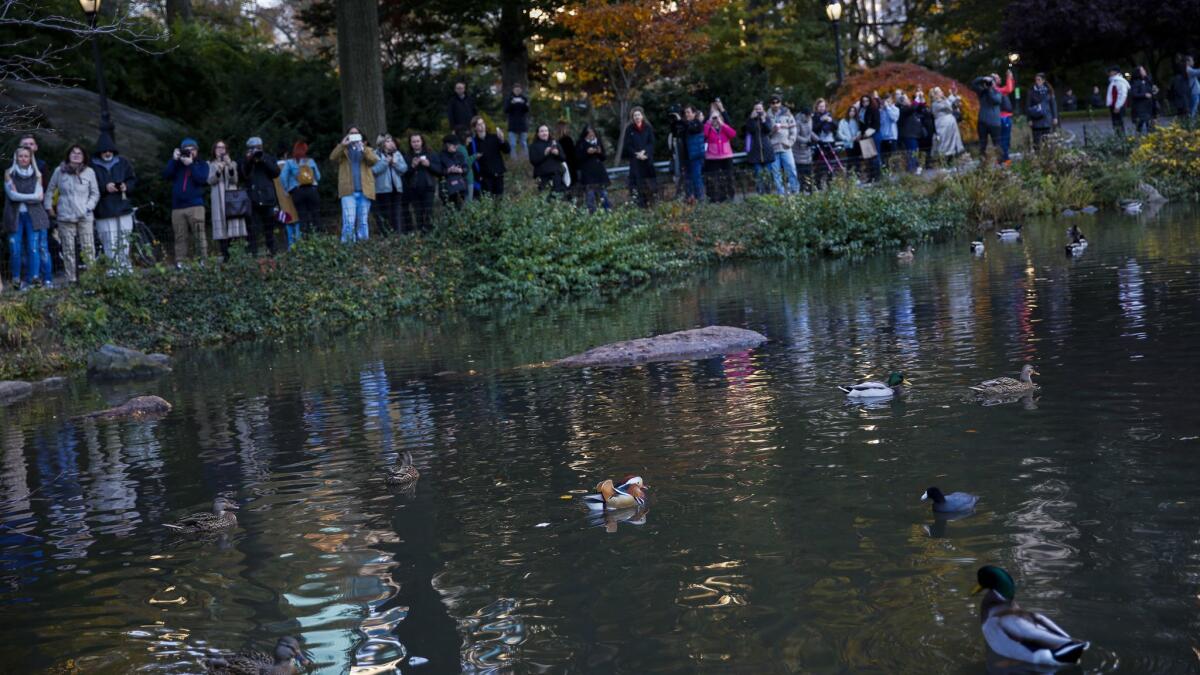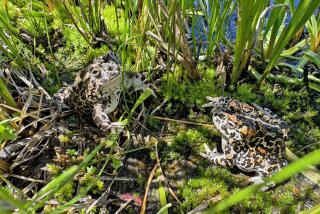New York is charmed by a stunning Mandarin duck that mysteriously ended up in Central Park

- Share via
Reporting from New York — He was first spotted in early October, napping in the duck pond in Central Park.
“I never saw a bird like that in my life,” said 52-year-old Joe Amato of Queens, who was among the first to film him.
The most beautiful waterfowl most people had ever set eyes on, he had a peaked crown of plumage, fluffy violet breast and wings blocked in white, blue and orange like a cubist painting of a flame. Bird blogs lighted up as his image — the markings left no doubt the bird was male — spread across social media, and local news channels visited the pond.
This much was obvious: He wasn’t from Manhattan.
“There’s no way you should see it here in New York City,” said Soumyajit Ray, a 29-year-old birder from Brooklyn who was photographing the duck one recent day.
The species Aix galericulata, better known as the Mandarin duck, is native to East Asia and Russia’s Far East, where just a few thousand remain in the wild. Its reputation for monogamy has made it a symbol of fidelity in China, where “Mandarin ducks and butterflies” was the name given to a sappy genre of early 20th century romance novels, the Harlequin paperbacks of their day.
The majority now live in zoos or private aviaries or on farms.
So how did this duck wind up in Central Park?

The Central Park Zoo, located just a few blocks from the pond, wasn’t missing any Mandarin ducks. Neither was the Bronx Zoo.
The duck appeared to have bands on its ankles, though not the detailed tags zoos and conservationists use, suggesting that he may have belonged to a breeder or a collector.
Mandarin ducks can be purchased as pets. For about $300, residents of the continental United States can buy a breeding pair online from Meyer Hatchery in Ohio, which also sells white peacocks and black swans. The birds ship through the U.S. Postal Service and arrive within a day or two, though the website says Mandarin ducks are currently out of stock.
New Yorkers have been known to collect odd pets, including pigeons, peacocks and a 350-pound Siberian-Bengal tiger named Ming, who had to be subdued by a police sniper with a dart gun in 2003 after he was discovered in a Harlem housing project.
Perhaps a private owner got fed up and dumped the duck.
It wouldn’t be the first time an unwanted or unsupervised pet wound up in Central Park, where 43 South American guinea pigs were once set loose in the Conservatory Garden and a 2-foot crocodile was once fished out of lake.
“Who knows?” Amato said as he considered the duck. “Somebody might have released it on purpose, knowing it would be this big thing. There’s a million and one stories, but we don’t know the truth.”
Amato said he’d seen a man ditching Muscovy ducks — which are native to Latin America and not exactly lookers — at the pond all summer and wondered whether there might be a connection.
But Tom Moorman, who has a doctorate in wildlife biology and serves as chief scientist at Ducks Unlimited, a conservation nonprofit group, said it’s unlikely a collector would abandon such a beautiful bird.
“Most likely he’s an escapee,” Moorman said. “My best guess would be he escaped captivity from an aviary and found a home in Central Park.”
That raises another question: Now that the duck is famous, why hasn’t the owner come to claim him?
The duck could have traveled a vast distance to get to New York. Ducks are powerful fliers, able to cover 25 miles or more in a day, and the forest-dwelling Mandarin in particular evolved with broader wings and tails that make them acrobatic enough to dodge trees and branches in flight.
His reason for choosing the pond is fairly simple, Moorman explained.
“One thing about ducks is that they’re pretty social,” he said. “If they see other ducks, they’re likely to drop in and join them if they can.”
Still, it took a little while for the Mandarin and the other ducks to get comfortable with one another.
“When it first started preening itself, all the local ducks were around it — they were a little curious — and he was just snapping at them,” Amato said. “He holds his own.”
Truly aggressive behavior is rare among ducks, and usually on display only in the presence of an eligible female. An unflattering portrait of the duck chasing a local hen through the water recently became a meme on Twitter.
Despite its reputation as a one-hen kind of duck, the species, like many other waterfowl, is only seasonally monogamous. It shacks up with a new partner each spring. If the newcomer had a mate back home, they have long since forgotten each other.
For the most part, the duck has assimilated to city life, according to his fans.
“He’s in our park; he’s one of us,” said Donna Hughes, 59, who lives in Manhattan and visits the duck almost every day with her twin sister, Doreen.
“He’s an immigrant,” her sister said. “None of us knows where he came from. That’s New York.”
New York Magazine’s “The Cut” named the “Hot Duck” the city’s most eligible bachelor. Gothamist dubbed him Mandarin Patinkin, after the actor.
The duck’s reputation took a hit recently when he was spotted across the Hudson River in Edgewater, N.J., but it recovered after he returned to the pond in Central Park.
“Maybe it’s trying to find its way back home and it can’t,” Amato said. “Maybe it was held somewhere in Jersey; who knows?”
He wouldn’t be the first Mandarin duck to put down roots far from home. A colony of feral Mandarin ducks has lived off Northern Ireland’s Shimna River since the late 1970s, and there are similar flocks in Sonoma, Calif., and North Carolina.
But winters there are far warmer than in the Northeast.
In the wild, Mandarin ducks that breed in Russia and northern China migrate south to the milder climates of Japan, southern China or the Korean peninsula.
In New York, the cold can quickly turn bitter, as recent weeks have proved. The temperature on Thanksgiving dropped to 18 degrees, the chilliest New York has recorded since 1871.
The duck survived, though it’s not clear he could make it through repeated cold spells.
The city parks department’s education crew, known as the Urban Park Rangers, is keeping close watch to make sure he doesn’t starve.
“A lot of people are worried about him,” Donna Hughes said. “These other ducks make it through the winter, but he’s not native.”
Sharp is a special correspondent.
More to Read
Sign up for Essential California
The most important California stories and recommendations in your inbox every morning.
You may occasionally receive promotional content from the Los Angeles Times.











